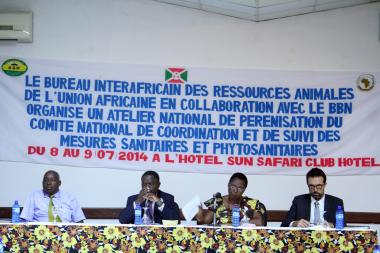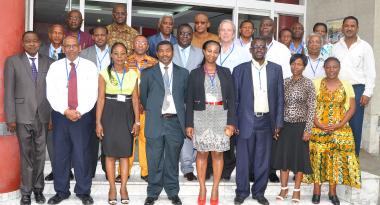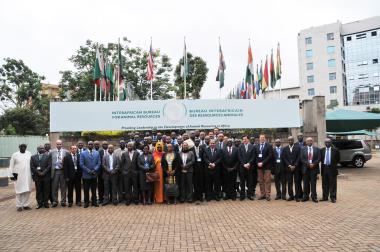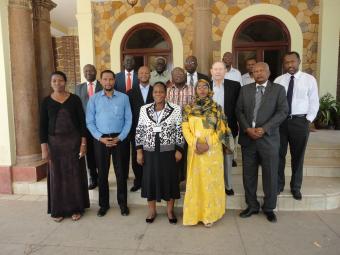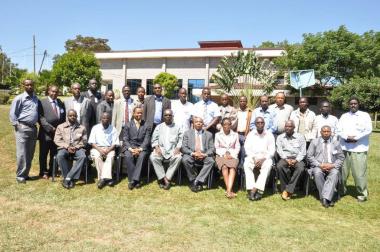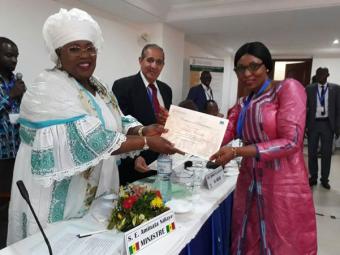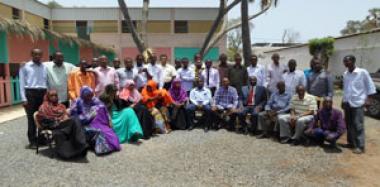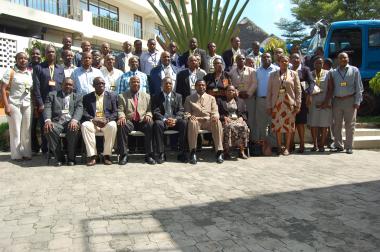In a bid to enhance animal health services in African Union (AU) member states, the African Union Interafrican Bureau for Animal Resources (AU-IBAR) and the Global Alliance for Livestock Veterinary Medicines (GALVmed) have proposed a comprehensive collaboration. The aim is to further improve the development, governance and distribution of quality veterinary medicines and vaccines.
On March 20, 2024, the two organizations held a meeting to discuss their vision of improving veterinary services and promoting preventative animal health measures in the livestock sector. Dr. Carolin Schumacher, Chief Executive of GALVmed, and Dr. Huyam Salih, Director of AU-IBAR, led the technical teams from the two organizations to discuss key areas of collaboration.
Building on Past Collaborations
Over the past decade, AU-IBAR and GALVmed have worked together on various initiatives and projects. Building on their previous collaborations, which have included initiatives such as Reinforcing Veterinary Governance in Africa (VETGOV), Livestock Development Strategy for Africa (LiDeSA), and Vaccines for the Control of Neglected Animal Diseases in Africa (VACNADA), AU-IBAR and GALVmed will continue to work together on similar areas of interests.
In the discussions, the urgent need for addressing challenges such as eradicating Peste des Petits Ruminants (PPR), prioritizing vaccine production, managing transboundary diseases, and implementing governance on Antimicrobial Resistance (AMR) was emphasized. GALVmed's crucial role in promoting vaccines and ensuring the availability of quality medicines in Africa was also highlighted, as it plays a significant part in combating AMR and improving animal health outcomes. These efforts have set the stage for future projects that align with AU-IBAR's Animal Health Strategy for Africa 2019-2035 and GALVmed's 2030 strategy.
Key Focus Areas and Collaborative Initiatives
Public-Private Partnerships (PPPs) will be a key focus for collaboration to enhance innovative business models for private sector engagements. This will be critical for harmonizing vaccine registration requirements, technology and knowledge transfer as well as capacity building for Vets and ParaVets. Further, the private sector engagement is expected to be key in supporting the implementation of AU-IBAR's Animal Health Strategy for Africa whose emphasis is on preventive measures and vaccination coverage.
The two organisations will work together to highlight the high-level research conducted by GALVmed and development of animal health products suitable for small-scale livestock producers in Sub-Saharan Africa to the AU Member States for policy-uptake. Additionally, GALVmed will work on commercial development activities to increase vaccination coverage, especially for the ruminants.
The meeting highlighted the importance of involving the private sector in livestock development initiatives and promoting evidence-based decision-making. GALVmed has incorporated digital technologies to enhance the livestock value chain. This will connect veterinary service providers and ensure quality service provision in the value chain. Challenges related to the affordability and accessibility of vaccines, especially for small ruminants, were discussed. Collaborative efforts through innovative solutions with the private sector will hence be important.
Women's inclusion in Livestock Value Chain
Women who are livestock keepers, play a crucial role in improving animal health and productivity. It is essential to involve them effectively in the livestock value chain and empower them in the sector to achieve gender equality. Discussions highlighted the need to enhance women's capacity in animal health strategies to increase their agency and participation. The potential for women to participate effectively in the value chain as micro-entrepreneurs was also discussed.
Policy Enforcement Advocacy and Communications
The importance of advocacy and strategic communications in these engagements was emphasized. The two organizations will work together to develop and implement effective advocacy tools and mechanisms to encourage investment in the animal resource sector, with a specific focus on animal health.
The partnership aims to also develop and update national and regional animal health investment policies. These policies aim to promote private sector involvement and engagement in preventive animal health services. The partnership will also focus on finalizing and implementing the African Union's acaricide resistance management strategy in Africa. Collaborative advocacy campaigns, Behaviour Change Campaigns, and Strategic Communications will be critical to stimulate public and private sector investment in the livestock sector.
To ensure successful engagement, supporting the Continental Animal Health Actors Platform (CAHP-Africa), Regional Animal Health Center (RAHC), and Regional Animal Health Network (RAHN) is critical. In addition to these efforts, the organizations will focus on data exchange, including analytics and information, intelligence, best practices, and approaches for disease control and eradication. This will include addressing critical diseases such as PPR, Rabies, Rift Valley Fever (RVF), Contagious bovine pleuropneumonia (CBPP) , Foot-and-mouth disease (FMD), Animal African Trypanosomiasis (AAT), and Brucella.
GALVmed is committed to supporting AU-IBAR in various capacities, including vaccine delivery systems, evidence generation for disease control, capacity development, gender impact measurement, and advocacy and communication efforts.
The collaboration represents a concerted effort to address challenges in animal health and promote sustainable development in Africa. By leveraging their expertise and resources, both organizations aim to make significant strides in improving animal health outcomes across the continent.
The GALVmed team was led by Dr. Carolin Schumacher, Chief Executive of GALVMED, Lois Muraguri Senior Director, Enabling Environment and Partner Engagement, Dr. Henry Wamwayi (GALVmed Board) and Edith Moroti Associate Director - Outreach & Partnerships.
The AU-IBAR team was led by Dr. Huyam Salih, Director of AU-IBAR, Dr. Annie Lewa, Senior Projects and Programs Officer, Dr. Hiver Boussini- Animal Health Officer and Animal Health Head of Unit and Ms. Fiona Imbali, Communications.

